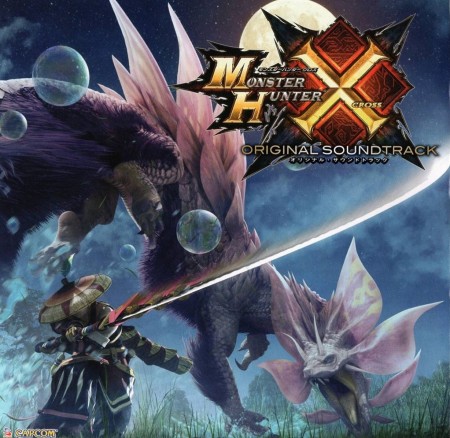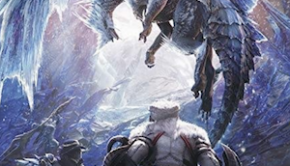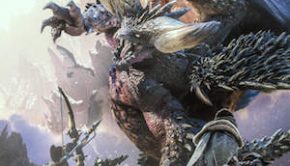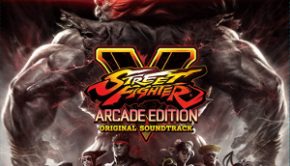Monster Hunter X Original Soundtrack
 |
Album Title: Monster Hunter X Original Soundtrack |
| Record Label: Suleputer |
|
| Catalog No.: CPCA-10392~ |
|
| Release Date: Dec 16, 2015 |
|
| Purchase: Purchase at CDJapan |
Overview
The latest installment of the Monster Hunter franchise, Monster Hunter X, with a score composed by Reo Uratani comes with its usual batch of area and village themes and epic battle tracks. My favorite part of listening to each new Monster Hunter score is diving into the wide array of the tracks in each genre and picking out new favorites. The battle tracks in particular are generally impressive, as creating such a large number of such intense tracks can be difficult without blending them all together. Reo Uratani returned to the franchise to create a new series of epic themes.
Body
The promo video track opens the album with a series of bright but aimless melodies before launching into the triumphant Monster Hunter theme that the listener has been waiting for, and Uratani has drawn out until the last moment. The theme returns later on in “MONSTER HUNTER X,” which opens delicately before launching into a darker rhythm. The piece shifts quickly from style to style, picking up all sorts of influences from Eastern accompaniments to electric guitars to a sudden string suspense chord. Finally, after a few dissonant notes, the triumphant melody returns. I found this second iteration of the theme more fulfilling than the first, with a more carefully developed build up.
After the opening track, the mood mellows out quickly with “Village Bringing Color to the Wind and Grassland ~ Belna Village,” which has a beautiful alto string gliding across a very amicable melody that swells and recedes along the way. A guitar keeps up a steady arpeggiated pattern with a light tambourine playing once or twice a measure, and the melody casually swinging across various accidentals. It’s one of the most relaxing town themes I have heard, and while it’s hard to pin down a memorable takeaway from the piece, there’s no doubt that the music provides a respite from the heavy battle music any Monster Hunter enthusiast should be expecting shortly. “Palico Square Theme” is more lively and upbeat, with an Irish flair and a jig rhythm.
It’s worth noting the plentiful town themes as they all seem to congregate around the first disc. “A Windy Gathering Place” is a bit more subdued than what we’ve come across so far, with a pipe (backed by lower pipes) holding out whole notes across the piece, slowly coming together to form a loose melody. Occasionally, the rhythm stops, and the main pipe gets some solo time. The album also features a slew of tracks under a minute in length, which range from the music box-styled “Time of Parting” to the “Proudly Serving Fondue, Bon Appétit” cooking themes.
One fun aspect of the albums are some of the returning themes (the main Monster Hunter theme included). It’s fun to see “Theme of Pokke Village ~ MHX ver.” return on this score, a familiar track from both previous Monster Hunter and Monster Hunter arrangement albums. “Searching for the Secret Hot Spring ~ MHX ver.” returns as well, with a slew of plucked strings that give the entire piece a very relaxed and mellow feel. It’s very meandering, and lacks the direction the “Theme of Pokke Village ~ MHX ver.” has, but is quite enjoyable on a surface level.
“Mon-Nyan Corps Fire Away!” has a cartoonishly militant vibe. The track moves along briskly, leaving behind a memorable theme – memorable mainly due to the number of times each phrase repeats. Another more miscellaneous track on the album, “The Awe-Inspiring Brave Figure” features variations of the Monster Hunter theme on a surprising acoustic guitar, giving the track a splash of Spanish flavor. The violin melody is additionally accompanied by a subtle vocal (or synth-vocal) backdrop. I actually enjoyed this rendition of the theme far more than the usual fanfare-ish versions – it had a bit of depth that the flashy openings often don’t.
“Ancient Manifestation” is the first real battle track on the album, and features the usual pipe-and-dotted rhythm in a surprisingly gentle battle theme, its genre only recognized by its distinctive differences from the town theme. The rhythm is prominent, and the melody is extensive, but I found the whole theme to be brighter than it is intense, or pulse-pounding. “Jumping Outlaw ~ Great Maccao” sounds far more ominous. Again, it’s not a particularly heavy track, but the bass, melody, and harmony lines all work together to create a vicious-sounding piece, pounding up and down a harmonic minor scale with no hesitation.
The battle tracks pick up quickly and split up into their specific genres. “Electric Rebel ~ Raizex” opens, as one might expect, with some heavy guitar riffs that alternate between background accompaniment to more prominent violins, and the lead instrument in an electric orchestra. “Bewitching Dance ~ Tamamitsune” is an extraordinarily fun battle track with a Middle Eastern flavor, complete with violin glissandi and pitched percussion that gives it continuously evolving splashes of harmonic color.
“Scorching Blade ~ Dinovalde” is bolder, but oddly Broadway-esque track, packed with brass and an insanely catchy rhythm against a Bond-like bassline. I found it almost cheesy at first, but the piece grew on me quickly. “Steady Mountain ~ Gamudo” takes the same large-orchestra feel with a gratuitous brass section and a beautiful melody that is countered by a descending series of notes in the very low bass – in fact, without those low notes, I would not have noticed the vivacity of the much higher violins.
The album also comes with two renditions of “TraBelna” – a full version, and an instrumental version. The full version, which featured vocalist Reina Ueda is a straightforward lyrical song with some great layered vocal harmonies. The piece is very upbeat and almost jazzy at points. I have to say that I actually preferred the instrumental version of the song (being partial to instrumental arrangements), which really highlighted the brass instruments. Unfortunately, it was not a true instrumental arrangement, as it simply had the vocal line taken away, and did not substitute it with any instrumental part. This left the piece feeling empty at parts, but I still found the whole work fun to listen to – there is a lot going on in the background that I found I had missed in the vocal version.
Summary
While it took me longer than usual to get into the swing of this score, I was eventually able to pick out my favorite of the battle and area themes. Having to work my way around so many short tracks made the choosing difficult, however, and a few of the battle tracks in particular missed the spot. However, the album did come with its gems, and enjoyable ones at that. Monster Hunter X Original Soundtrack can be purchased at CDJapan.
Do you agree with the review and score? Let us know in the comments below!
3
Posted on February 28, 2016 by Emily McMillan. Last modified on February 28, 2016.














